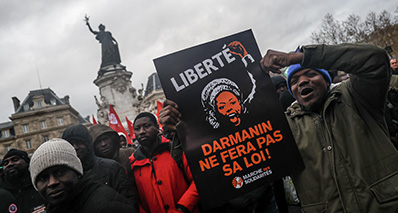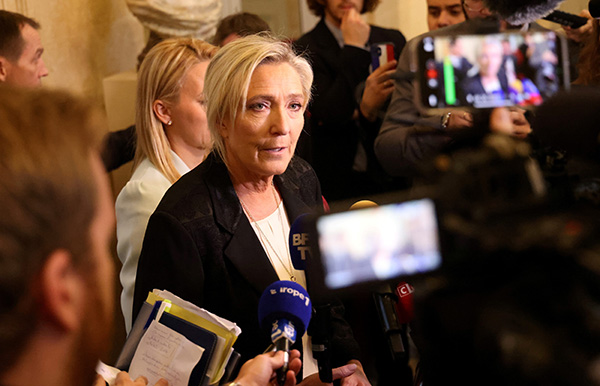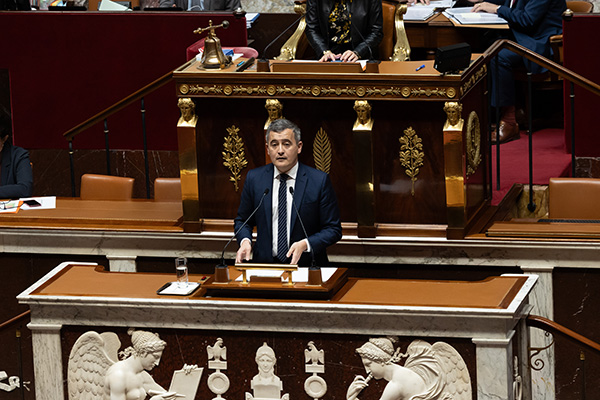France’s Immigration Law Is No ‘Ideological Victory’
Augustin Goland, American Renaissance, January 12, 2024

Credit Image: © Mohammed Badra/EFE via ZUMA Press
Subscribe to future audio versions of AmRen articles here.
There has been a lot of fuss in France about the new immigration law passed by parliament on December 19, 2023.
The Left has blasted it as a bow to Marine Le Pen’s National Rally (RN), and President Macron’s interior minister, Gérald Darmanin, felt he had to fend off those accusations by boasting it would have been adopted even without the support from Le Pen and her MPs during the final vote in the National Assembly.
The arithmetical truth is that had National Rally deputies voted against the government’s immigration bill, it would have been defeated after a year and a half of discussions. Only if they had abstained could this bill have been voted into law without the National Rally’s voices. The French media were quick to note the interior minister’s lie.
The necessity of Miss Le Pen’s support was too much to bear for the left wing of President Macron’s Renaissance party, whose idea of a national renaissance differs greatly from that of American Renaissance and is closer to that of Joe Biden and the pro-migrant Democrats.
The reason why Marine Le Pen’s MPs could have defeated this bill was actually that Renaissance’s most left-minded MPs had decided to vote against it. Otherwise, France’s center-right Republicans’ support would have sufficed to push it through parliament.
The government camp can count on 250 deputies, including 170 belonging to Renaissance and 80 belonging to two allied parties, out of a total of 577 in the National Assembly. The National Assembly is the lower house of parliament, and it has the last say on legislation in cases of disagreement with the Senate, which is dominated by the Republicans (LR).
The center-right Republicans have been left with 62 deputies in the National Assembly after last year’s election, and now is the first time in several decades that they are neither the governing party nor the biggest opposition party. Last year’s parliamentary elections have greatly reinforced the role of Marine Le Pen’s RN, making it the biggest opposition party in the National Assembly for the first time in history, with 88 deputies. The second biggest opposition party, ahead of LR, is the radical leftist party France Unbowed (LFI). The prominence of these two parties shows how much the French are fed up with their political establishment.
However, it was the LR party, thanks to its central position, with whom the government led by Prime Minister Elisabeth Borne had to negotiate the final form of the anti-immigration bill voted into law by the National Assembly, with 261 votes in favor and 186 against. Only the two parties on the right of President Macron’s Renaissance, RN and LR, had all their deputies voting in favor, while 20 Renaissance deputies voted against and 17 abstained. Left-wing parties voted against it.
Following that vote, two ministers decided to step down: the health minister and the higher education minister. They did not want to be in a government that has to rely on the RN’s votes in parliament to enact new laws. They also disagreed with the new law, which, in their opinion, is going to take away what they see as essential rights for migrants.
In 32 of France’s 101 departments, the Left has said it will not apply some of the restrictions on these rights, in particular concerning state allowances which departments are in charge of distributing.
“We, the presidents of left-wing departments, refuse to accept the application of the Personalized Autonomy Allowance (APA) component of this law, inspired by the extreme right, and carried by an executive that claimed to embody moderation, but which is now merely an illustration of compromising behavior,” they declared in a press release.
Stéphane Troussel is the president of Seine-Saint-Denis, a department near Paris that has the highest proportion of immigrants in continental France, at 32 percent, and also has many “French” people with immigrant backgrounds. On December 20, Mr. Troussel wrote on X: “I will do my utmost to ensure that the [Seine-Saint-Denis] Department is a republican shield against national preference. All the inhabitants of Seine-Saint-Denis deserve solidarity and humanity. Wherever they come from. We will continue to pay the APA to legal resident foreigners.”
Marine Le Pen, although she was not involved in the negotiations on the government’s immigration bill between Prime Minister Borne and the center-right LR party, has claimed an ideological victory. According to her, the new law does introduce a national preference for social benefits, something Marine Le Pen’s RN, and earlier her father’s National Front, have long advocated.

December 19, 2023: Marine Le Pen speaking about the immigration law. (Credit Image: © Maxppp via ZUMA Press)
As defined by Jean-Marie Le Pen in 1988, this national preference meant that “The French will have priority for work, and Europeans, under our agreements, will also have priority in social services, in the allocation of low-cost housing, in family policy, and so on.” For that reason, he said, non-European foreigners “will have no reason to stay, as they will no longer be supported by French taxpayers.” According to a December survey, that is something almost three-quarters of French people would support.
President Macron’s new immigration law does indeed go a step in that direction by making a foreigner’s right to child allowances, housing benefits, and other such welfare benefits depend on whether he has lived in France for at least 30 months (for those who have a job) or five years (if unemployed). This does not apply to students, however, nor to refugees whose asylum requests have been accepted or to foreigners with a residence permit.
The conditions for family reunification, which is an essential source of legal but uncontrolled immigration in France, have been made a little stricter: A foreigner will be able to bring in his family only after 24 months of legal stay, provided that he has stable, sufficient resources and health insurance. That may be better than nothing, but it is not going to stem the influx of legal immigrants through family reunification.
The law requires that visas for medical care in France be issued only when there is no appropriate treatment available in an applicant’s home country and only if the applicant can cover the cost of the care.
The center-right LR negotiators said they also wanted to suppress France’s state medical aid that allows illegal immigrants to get free medical care while in France, which critics say is an attraction. This generous aid provided to illegals comes at a great cost to the French taxpayer (about $1.2 billion in 2023). The number of registered beneficiaries has increased by 43 percent since 2019, reaching 423,000 last year.
LR finally backed down on that demand, however, after the government side promised that this aid would be reformed in early 2024.
The law makes it possible to deprive a binational of his French citizenship if he is convicted of murdering a law enforcement officer. In addition, citizenship will no longer be granted automatically when a foreigner born in France turns 18. He will have to request it first, and it will be denied to people convicted of crimes.
Being in France illegally has been made an offense again, as was the case before 2012, when it was suppressed under Socialist president François Hollande. It will henceforth be punishable with a fine of €3,750 — the same amount as the fine until 2012. Before that time, however, being illegally in France was also punishable by a year in prison.
Nevertheless, several pro-migrant, left-wing organizations, such as the communist CGT trade union, the very woke SOS Racisme NGO, and the Cimade NGO, have claimed that the new law is the harshest anti-immigration law in 40 years. Unfortunately, that is highly questionable. Most measures contained in the law existed earlier, in the 1990s and 2000s.

December 22, 2023: Protesters demonstrate in Paris against the immigration law. Their banner says, “Legalize all illegal immigrants. No to the Darmanin law. No man or woman is illegal.” Copyright: xBrunoxLevesquex (Credit Image: © Imago via ZUMA Press)
For example, France’s new law makes it easier to deport foreigners convicted of crimes that are punishable by three or more years in prison. It was center-right interior minister (and future president) Nicolas Sarkozy who introduced restrictions on the application of what he called “double punishment” (imprisonment in France coupled with deportation afterwards) under center-right president Jacques Chirac in 2003.
Mr. Macron’s government had to back down on its desire to legalize the stay of illegals who have unofficial jobs in sectors of the economy with labor shortages, for example restaurants and bars. However, the prefects (the government’s representatives in the departments and regions) will be allowed to legalize the stay of illegals on an individual basis. That will lead to the legalization of some 10,000 illegals each year, as France’s interior minister himself admitted.
This is hardly an improvement, especially since the prospect of legalization is a powerful pull factor for those who haven’t yet immigrated to Europe.
Finally, France’s parliament will now vote on quotas for legal immigration according to the new immigration law, deciding the maximum number of people allowed to migrate legally to France for the next three years. This is the only measure in the law that is really new for France. In the 2007 presidential campaign, candidate Sarkozy had promised to introduce such quotas but he backtracked as president.
But President Macron thinks France’s constitutional court, the Constitutional Council, will invalidate this one new measure anyway, and he has said so loudly to reassure his left wing.
Although Marine Le Pen hailed the law as an “ideological victory,” and the law’s adoption with the RN votes has led to an internal crisis in the government camp, this is no revolution in France’s immigration policy. Miss Le Pen’s MPs had good reasons to vote for it, if only to make the government and Interior Minister Gérald Darmanin uncomfortable and to avoid accusations that they had voted against restrictions on immigration. But the law represents just a series of small steps forward and at least one step backward, with more legalizations of migrants’ stays to come.
Amusingly enough, shortly before the final vote, Interior Minister Darmanin, speaking from the National Assembly rostrum, tried to convince Marine Le Pen and her party not to vote for the government’s bill, stressing among other things the expected increase in legalized immigrants.

December 11, 2023: French Interior Minister Gerald Darmanin attends a debate on the draft law to control immigration at the National Assembly. (Credit Image: © Alexis Sciard/IP3 via ZUMA Press)
The fact is, France’s new immigration law does not introduce forced returns (so-called “pushbacks”) for those caught illegally crossing the border (which, most of the time, is not monitored anyway since France is part of Europe’s Schengen Area); it does not facilitate deportations of those illegal immigrants who have not been convicted of crimes committed on French soil; and it does not even allow for the detention of illegal immigrants, although it makes illegal immigration an offense again. It introduces quotas for legal immigration, but only with President’s Macron promise that this will be struck down by the Constitutional Council (a promise likely to be fulfilled, given the political character of that body); it does not suppress welfare benefits for immigrants but only postpones them a little; and so on.
In a December 20 opinion piece published on the center-right daily Le Figaro’s website, Eric Zemmour, a former presidential candidate and the leader of the Reconquest party, wrote of the new immigration law that it is actually “worse than nothing.”
“In truth, this law is in line with the twenty-nine that have preceded it over the last thirty years: a sand dam to stop a gigantic wave,” he wrote.
“What do we know for sure about this law?” Zemmour asked. “That it does not abolish the jus soli. It does not abolish family reunification or family immigration. It does not abolish the state medical aid [for illegal immigrants], or social benefits for non-European foreigners, which are the suction pumps of immigration. It does not allow for the deportation of delinquents, criminals, and dual nationals on the S list [considered by the police to be posing a potential threat]. It will not concern any Algerians, since that country’s nationals still benefit from the migratory privileges of the 1968 agreement. It will therefore continue to let in 100,000 foreign students, 150,000 asylum seekers, and 100,000 family reunification immigrants every year.”
In total, France — a country of 68 million inhabitants — is letting in almost half a million new immigrants every year, both legal and illegal.
For his part, President Macron defended the law on television just after it was adopted by parliament, pretending that it was going to step up the fight against illegal immigration.
“I find it hard to think that fighting illegal immigration is only right-wing,” Macron said. “The working-class electorate is in favor of it. When you live in working-class districts, you experience safety issues, and, sometimes, immigration that is not well controlled, of which you bear the consequences, then you are in favor of this law. When you live in the nice districts where you don’t have the consequences of this illegal immigration, or other problems linked to insecurity, then there is no issue for you and you can say this law is not right. There is an immigration problem in our country because there is too much illegal immigration and this creates some imbalances, some issues, and some pressure. But I don’t believe that we are being overwhelmed with immigration.”
The truth is that President Macron does not see legal immigration as an issue, although it is the main source of immigration in France. Most Frenchmen do. Two-thirds (66 percent) think there are too many non-European immigrants in France, according to a CSA survey published last November.
Macron’s new law on immigration — for all the noise made by the Left and the claims of “ideological victory” on the right — is not going to change things radically in France. As usual with the French president, he is creating an illusion, and this is nothing more than a stunt.
The illusion is that the French executive is finally going to stamp down on immigration when he is not. A real change in immigration policy is unlikely to happen in France while globalist rulers remain in power.















